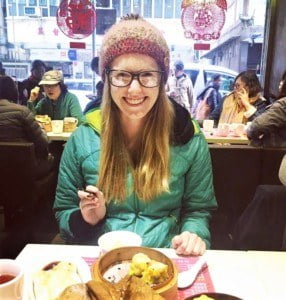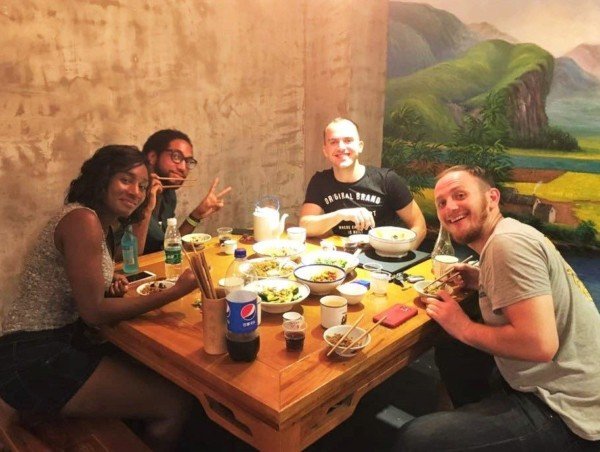Eating at restaurants and trying bizarre food was probably my favorite part of living in China.
However, if you don’t speak a word of Mandarin, going out to eat can be scary. Once you learn a few key phrases, though, you’ll be anxious to show off your skills to any Chinese server who will listen!
Of course, you’ll want to memorize words for common foods you like. But there are other phrases you should know, too. Here are a few helpful Mandarin words and phrases that will majorly impress your server.
 1. Wǒ xiǎng yī xia (我想一下) vs. Wǒ yào (我要)
1. Wǒ xiǎng yī xia (我想一下) vs. Wǒ yào (我要)
When your server approaches the table to take your order, you can either tell them that you’re still deciding or that you know what you want.
“Wǒ xiǎng yī xia” means “Let me think.” “Wǒ yào …” means “I want …”
If a server comes to your table but you’re still trying to decide what you want, say “Wǒ xiǎng yī xia,” and motion to the menu, and they’ll understand to come back in a couple minutes. If you’re ready to order, say, “Wǒ yào _____.”
2. Wǒ bù yào (我不要)
Once you’ve memorized “Wǒ yào,” you can easily remember “Wǒ bù yào.” Add “bù” before any verb, and that single word makes the sentence negative. “Wǒ yào” means “I want it,” and “Wǒ bù yào” means “I don’t want it.”
A server might ask you if you want soup or rice with your meal. If you don’t want these things, just say, “Wǒ bù yào.” This phrase can save you a little money!
3. Wǒ yào bīng shuǐ (我要冰水)
This phrase means “I want ice water.”
Chinese people always prefer their water warm or hot, so no one automatically gives you cold water. In the West, most of us love ice water.
Just say “Wǒ yào bīng shuǐ” if you want ice water. Your server might still give you a weird look because, come on, who drinks ice water, guys? But they’ll at least understand what you want.

4. Càidān (菜单)
“Càidān” means “menu.” If you’re walking around a neighborhood, trying to decide where to eat, it’s perfectly acceptable for you to ask to see a restaurant’s menu before you decide to eat there. If you don’t ask for a menu, they’ll automatically seat you. Then you’ll find yourself in an awkward situation!
5. Yŏu méiyŏu …? (有没有)
This phrase means “Do you have …?”
If you’re eating somewhere that only provides menus in Mandarin, you can simply ask them if they have something you want. It will save you a lot of grief if you’re not just staring at a Chinese menu, trying to decipher it.
6. Là (辣) /bù là (不辣)
A lot of Chinese food is spicy, especially street food. You’ll often hear employees ask you, “Là?” They’re asking if you want your dish spicy.
Depending on what you want, you can reply, “Là,” which means you want it spicy, or “bù là” which means you don’t want it spicy.
 7. Zhè gè shì shén ma? (这个是什么)
7. Zhè gè shì shén ma? (这个是什么)
This phrase means “What is this?” I asked this question a lot when I was at food markets. I pointed to whatever I saw and asked them what it was. This phrase is especially helpful if you’ve already memorized some Mandarin words for foods.
You can also ask this question at restaurants that have picture menus or photos of their dishes on the walls. Knowing what’s in the picture can help you decide whether you want that dish or not.
8. Duōshǎo qián? (多少钱)
This phrase is very important! It means, “How much is it?” Remember to also study your Chinese numbers! Otherwise, you might know the question, but you’ll have no idea what their response is.
I’d also recommend you check out the Chinese Food Menu here. It lists some more useful phrases used in a restaurant as well as some popular dishes. Also, the Google Translate app can be very useful for translating conversations and also for ‘scanning’ the menu and having it translated in real time.

















Leave A Comment